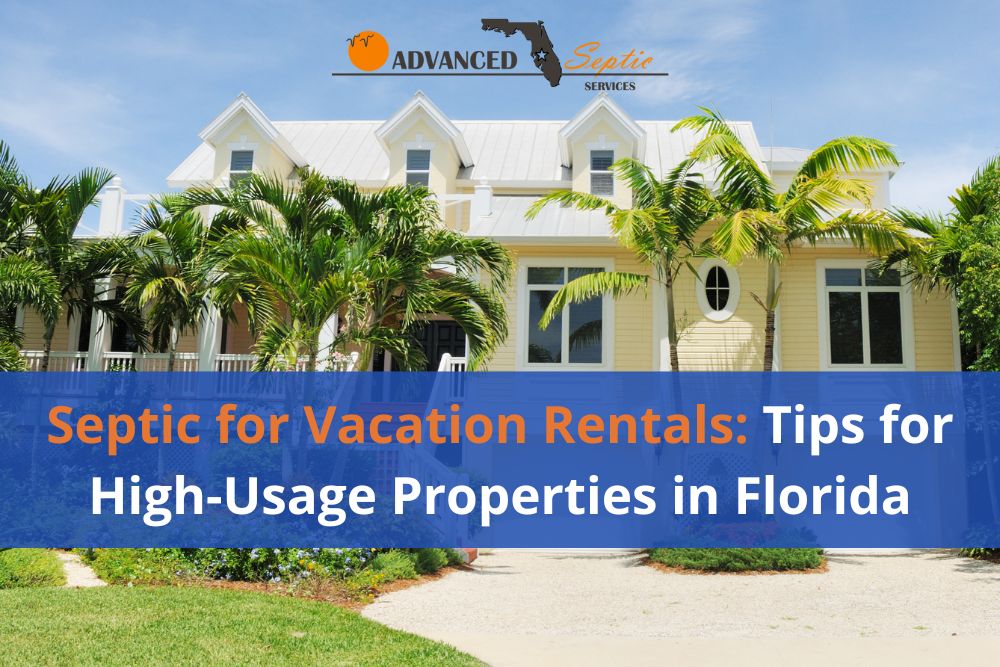Property owners must be especially vigilant when managing septic for vacation rentals in Florida.
Unlike typical residential systems that see consistent, moderate use, short-term rentals often experience unpredictable spikes in occupancy and water usage. These high-demand cycles can strain septic systems considerably, increasing the risk of backups, foul odors, and costly repairs. With the right maintenance strategy, however, owners can keep their systems running smoothly and avoid potential disruptions that might upset guests or damage the property’s reputation.

Understanding the Unique Challenges of Septic for Vacation Rentals
Florida’s booming tourism industry means vacation rentals often have back-to-back bookings, especially in coastal and tourist-heavy areas. This frequent turnover leads to heavy water usage, excessive waste input, and unpredictable usage patterns—all of which create unique challenges for managing septic for vacation rentals.
Some common issues in high-usage vacation properties include:
- Overloading the system with excessive wastewater
- Improper disposal of non-biodegradable items
- Guests unfamiliar with septic system care
- Limited downtime for routine maintenance
Given these challenges, property owners need a proactive and informed approach to keep their septic systems functioning efficiently.
Tips for Managing Septic for Vacation Rentals
1. Schedule More Frequent Septic Pumping
Standard septic systems should be pumped every 3–5 years, but that timeline shortens significantly when dealing with septic systems for vacation rentals. Depending on the size of the property and frequency of use, pumping may be necessary every two years or even annually. This helps prevent solid buildup in the tank, which can lead to system clogs and failure.
In Florida’s humid climate, increased bacterial activity may also accelerate decomposition, which can alter the balance inside the tank. Regular inspections and pumping help maintain the proper environment for waste breakdown.
2. Educate Your Guests
Many vacationers are unfamiliar with septic systems, especially if they come from urban areas with municipal sewer systems. This can lead to well-meaning guests flushing items like baby wipes, sanitary products, or grease down the drain—all of which can wreak havoc on your system.
Post simple, friendly signage in bathrooms and kitchens to protect your septic system for vacation rentals. A short note explaining what not to flush or pour down the drain can go a long way in preventing clogs and backups. Consider including the message in your welcome guide or house rules as well.
3. Use Water-Efficient Fixtures
High-usage properties benefit greatly from low-flow toilets, showerheads, and faucets. Reducing the amount of water entering the system minimizes stress on your septic tank. It allows more time for solids to settle and the drain field to filter wastewater.
Water-efficient appliances are particularly important in Florida, where environmental and legal pressures emphasize water conservation. Installing Energy Star or WaterSense-certified fixtures can also improve your property’s eco-friendly appeal—a bonus for environmentally conscious guests.
4. Monitor Laundry and Dishwasher Use
Laundry and dishwashing machines are heavy water users. If your vacation rental has these appliances available, provide clear usage instructions.
Consider installing timers or smart devices that control usage during peak periods. Space out usage when guests are absent or have checked out to reduce back-to-back system demands.
5. Landscape Wisely Around the Drain Field
The drain field is one of the most critical components of your septic for vacation rentals. Keep it in top shape by avoiding planting trees or shrubs with aggressive roots nearby. These can damage underground pipes and lead to expensive repairs.
Ensure guests do not drive or park over the drain field, as compacted soil limits proper wastewater filtration. Installing subtle fencing or signage can help keep the area protected without detracting from the property’s aesthetics.
6. Partner with a Florida-Based Septic Professional
Routine maintenance by a licensed Florida septic professional is essential. They understand the specific soil types, weather patterns, and regulations that affect septic systems in the state. Regular inspections can help identify minor issues before they escalate, particularly in high-usage properties.
Suppose your property is managed remotely or through a vacation rental platform. In that case, hiring a local company to provide on-call septic support is worthwhile. That way, emergencies can be handled promptly—even when you’re not nearby.
7. Maintain a Septic Log
Keep a detailed record of all maintenance, pumping schedules, inspections, and guest-related incidents involving the septic system. This septic log can be a lifesaver in case of recurring issues or warranty claims. It also allows you to track patterns in usage and plan accordingly.
Additionally, such records can be helpful for future property buyers or investors, adding to the overall value and trustworthiness of your rental business.
Protecting Your Investment
Managing septic for vacation rentals in Florida requires foresight, education, and regular maintenance. With tourists coming and going year-round, your septic system must be ready to handle anything from a quiet weekend getaway to a packed family reunion.
You can keep your system running efficiently and avoid costly surprises by proactively managing usage, educating guests, and working with experienced septic professionals. A healthy septic system not only supports a better guest experience but also safeguards your property’s long-term value and bottom line.
Need help with your septic for vacation rentals? Contact Advanced Septic Services of Florida for expert guidance, routine maintenance, and fast emergency response for Florida property owners. Call us today at (352) 242-6100.


Leave A Comment
You must be logged in to post a comment.